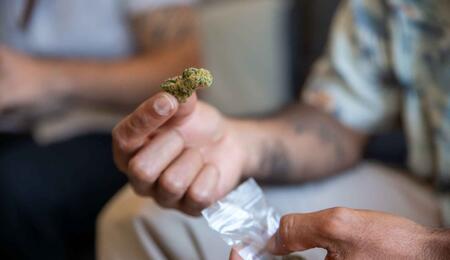New York's Marijuana Guide for the Workplace

The New York Department of Labor (DOL) recently issued guidance and FAQs regarding marijuana in the workplace. According to the instructions laid in the guide, New York employers may not refuse to hire, employ, discharge, or practice discrimination against a person who uses pot in their free time, such as after the work hours are finished and away from the company's headquarter, offices or any other properties. New York was one of the U.S. states to legalize the recreational use of pot earlier this year.
Here are some of the major points made in the DOL Guidance:
- Generally, marijuana drug tests are not permitted. Unless in specific circumstances, such as when the federal law demands a test for particular job positions;
- The result of a drug test cannot be used for an employer's conclusion that an employee was impaired by marijuana;
- The smell of marijuana cannot be used as evidence the person is impaired and underperformed at work.
According to the DOL guidance, employers must cite "articulable symptoms of impairment" in almost any effort to take action against an employee because of marijuana use. An employer must provide "objectively observable" evidence when they aim to prove marijuana use negatively impacts an employee's job performance or overall workplace safety. The guidance clarifies that "observable signs of use that do not indicate impairment on their own cannot be cited as an articulable symbol of impairment."
Employers reserve the right to prohibit marijuana use during work hours, including meal, break, and on-call periods. They may also prohibit marijuana possession on company property, including the company's vehicle.
Employers may take employment actions related to marijuana use in several instances. When the employee manifests specific "articulable symptoms" of marijuana impairment while working, which decreases or lessens the employee's performance of their tasks and duties, or threatens the workplace's safety, the employer can take action.
When federal or state law mandates drug testing as a condition for the job position, the employer also must ask for a test. These are instances when, whether a test is not provided, the employer violates federal law or risks losing a federal contract or federal funding.
The guidance also notes that employers are not legally required to take any action at all if employees use cannabis on the job, even if those employees are under the legal age of 21.
Below is the answer to several frequently asked questions regarding DOL's workplace and marijuana guidance.

What counts as articulable symptoms of impairment?
A comprehensive list of "articulable impairment symptoms" has not been released, however, it helps to think in terms of handling specific machinery recklessly or driving the company's vehicle under the influence even after the work shift is over. By articulable symptoms, the regulation refers to all observable actions where the employer can see their hired personnel is not performing as should.
Employers are however warned that such articulable symptoms may also indicate the employee has a disability protected by federal and state law, such as the NYS Human Rights Law.
What doesn't count as articulable symptoms of impairment?
Observable signs of use—such as marijuana smell—that do not indicate impairment on their own cannot be cited as an articulable symptom of impairment. Only observable indications where the employee is failing to fulfill their duties are valid.
Under Labor Law Section 201-d, the smell of cannabis on its own is no evidence of articulable symptoms of impairment.
Furthermore, a urine test or any other test to prove a person has consumed marijuana DO NOT represent a valid basis for an employer's conclusion that an employee was impaired by the use of cannabis. This is for the sole reason that drug tests cannot confirm a person was intoxicated at the present moment.
Employers can still undertake disciplinary actions against employees using marijuana during work or at an employer's property.
In which cases may employers prohibit the use of cannabis?
Employers have all the right to prohibit the use of marijuana during work hours. This includes the time when an employee is "on-call" or expected to be engaged in work. Paid and unpaid breaks, meal periods, or performing a task away from the worksite.
As far as remote work is concerned, an employee's private residence is not considered a "worksite" under New York State labor law. Employers can create a general policy prohibiting the use of marijuana during work hours, but they may only take employment action if an employee exhibits "articulable symptoms of impairment." This means that texting your boss while high during the work shift is probably not a good idea.
New York lawmakers legalized weed on March 31, 2021, enabling residents to possess up to 3 ounces of pot on their person. Residents have to be at the legal age of 21 or above to buy and consume marijuana. The state also automatically expunged past convicts for possession of fewer than 3 ounces of weed.







